Omar Shehata
Outdoor cats & epistemology
From Omar's notebook.
I stumbled on an argument on Reddit about whether it's OK to have outdoor cats. I realized it captures really well an interesting dynamic I see in my everyday life, related to how we understand the world & seek truth.
Before I tell you my thoughts, I'm going to show you the argument in full.
I really want to hear which side of this argument you're leaning. Not just in the specific substance (like whether outdoor cats are good/bad), but in approach. Each side seems to have a different pattern for figuring this sort of thing out.
Which one do you relate with more? Post a comment, or email/text me. (I'm especially curious if you start out leaning one way and switch as you read more).
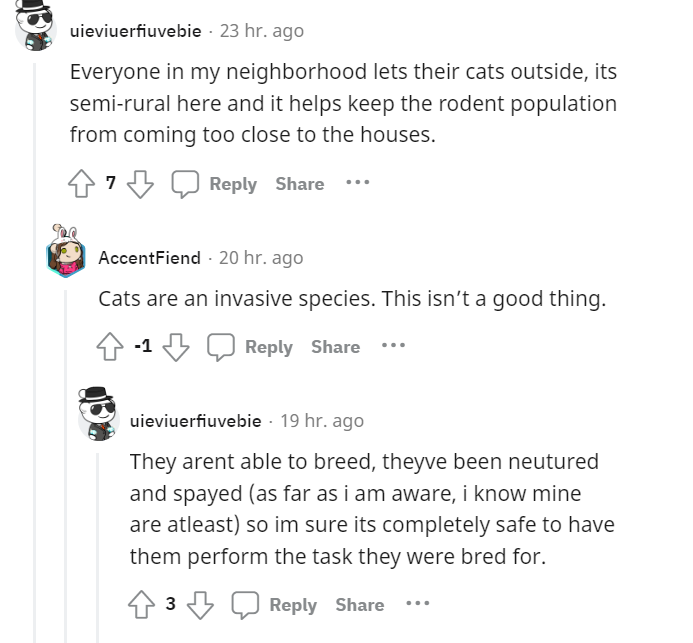


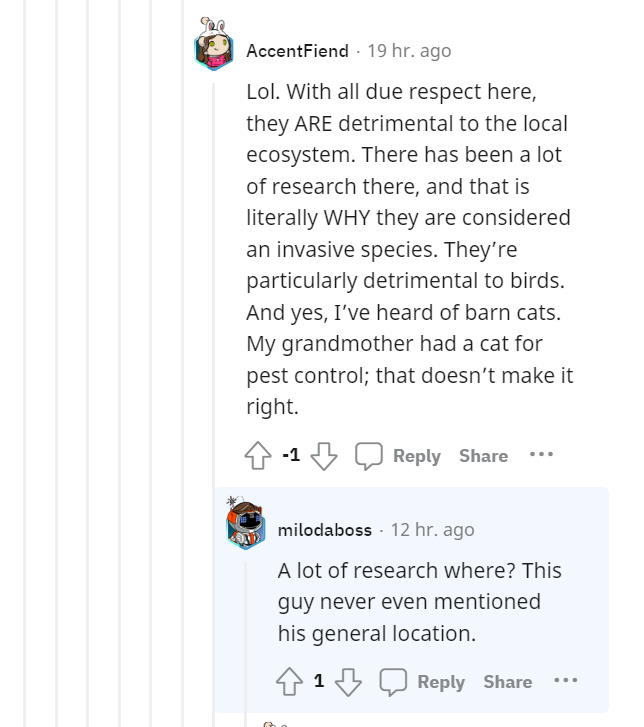
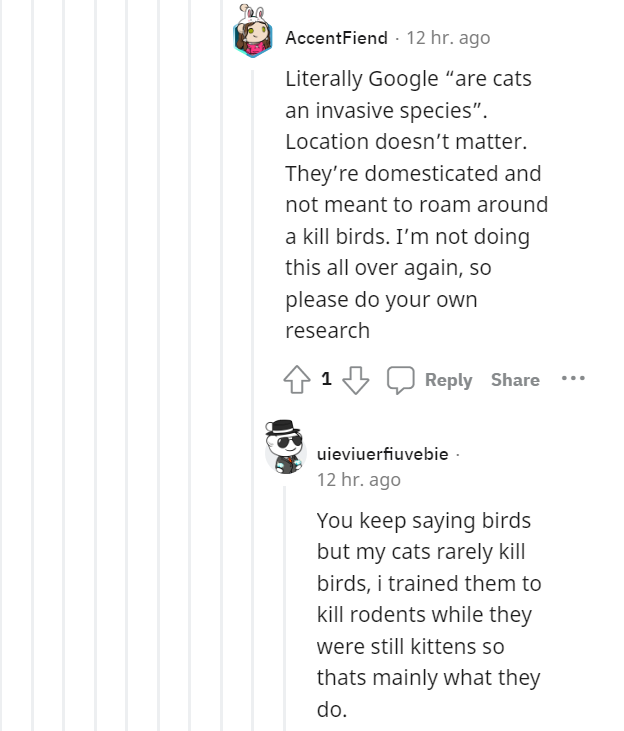
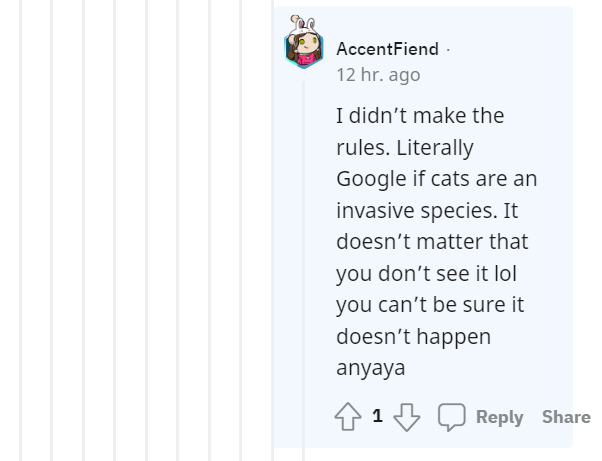
My thoughts
Ok so there's a lot of interesting things going on here. I'm going to go over each section with my commentary.
The gist of the 1st counterargument is: "you're saying outdoor cats are bad, but I think they're NOT causing any harm here, for these reasons that are specific to my situation".

This is where I immediately aligned with the PRO-outdoor-cat poster.
This gives me a hint about the poster's attitude about rules: they prefer to understand why a rule exists, and are willing to break it if it doesn't make sense.
As far as they understand (which may be an incomplete understanding, mind you), there are some reasons why outdoor cats may be bad, but none of those reasons apply to their specific neighborhood/cats. So, it's fine, right?
Now I find the counter to this very strange: the ANTI-outdoor-cat poster just repeats the fact they said before. "Sorry, but you're wrong".
I can see why they argue this way: in their mind, they already know the truth; outdoor cats are invasive and bad for the ecosystem. It doesn't even matter what the other poster says. In fact, you can see this happening very transparently below. They're essentially saying: "it doesn't matter what additional info or circumstances you add, it is a FACT that outdoor cats are bad in this country, why are you trying to argue with fact".

At this point it's very clear that the two posters have very different frameworks for understanding the world. They're talking past each other.
After this, the PRO-outdoor-cat poster again gives more reasons why they believe the cats are NOT harmful in their particular circumstances. They are appealing to their firsthand experience as proof.
I think what this poster is asking for in good faith at this point is: "if there are studies that show cats are bad for the environment, well, can you tell me what harm exactly they cause? Either it doesn't apply in my case, or there IS genuinely something I am missing, in which case, I'd love to know!"

I love the "with all due respect" part below because I think it hammers in this appeal to authority as a way of knowing what is true. It feels like saying, "who are YOU to disagree with established scientific fact?"

On and on it goes.

Now here's the final part I'll comment on, which gives us a rare glimpse into how this person reconciles an important conflict: what happens when personal experience disagrees with established scientific fact?
Their reaction to this seems to be, "I can't explain to you why your personal experience is wrong, but I know it MUST be wrong, because it contradicts scientific fact". Like, they don't seem to even attempt to figure it out, they're not asking any questions or trying to get more information.
They seem to be very sure of this truth, even if there's no way for them to validate it.

The "I didn't make the rules" part sounds tome like "I'm sorry, I don't understand it either, but these are the fact that we are given as true! Neither you nor I have the authority to say this is wrong".
Who wins the argument?
I want to take a moment and thank both of these posters. Neither of them are trolling. They are both earnestly trying to communicate what they know to be true, AND explaining why they know it to be true.
The tragic part is that they both walk away from this interaction believing that some people in the world are dumb/unreasonable etc. This is a really good example of how knowing a little bit about philosophy really does come up in every day life.
I think they BOTH have reasonable ways of finding truth. It's just that, not realizing this meta difference made the discussion frustrating & unproductive for both of them.
With that said, in this specific example, I side with the PRO-outdoor-cat. At least from what is presented here, I'm not convinced these rural feral cats are causing any ecological issues.
There's one final comment on that thread that I think captures the nuance of the truth here pretty well:
No given species is inherently invasive or not. Whether a species is invasive depends entirely on location, as species will have a different effect on different ecosystems. Cats can absolutely be invasive, but you don't know where this guy lives.
Personal experience (sometimes?) trumps consensus fact
I generally lean more this way.
Every time in my life I had this thought: "this thing makes NO sense...but everyone says it's correct. Maybe I'm just dumb and should trust everyone" it paid off to keep digging & keep doubting. It ended up either (1) exposing a missing insight that wasn't obvious/well known, and that gave me a deeper understanding, or (2) it actually was NOT right, and I ended up correcting something for everyone in my community.
I now think it's a bad idea to default to "I really don't understand why this is true, but I'm told it's true" answer.
At the same time, it's NOT unreasonable to accept truth because of authority/social consensus. It's usually right anyway.
You can't doubt everything, all the time. But I think you CAN doubt anything. Doubt & probe until you understand. Or, in the words of Randall Munroe:
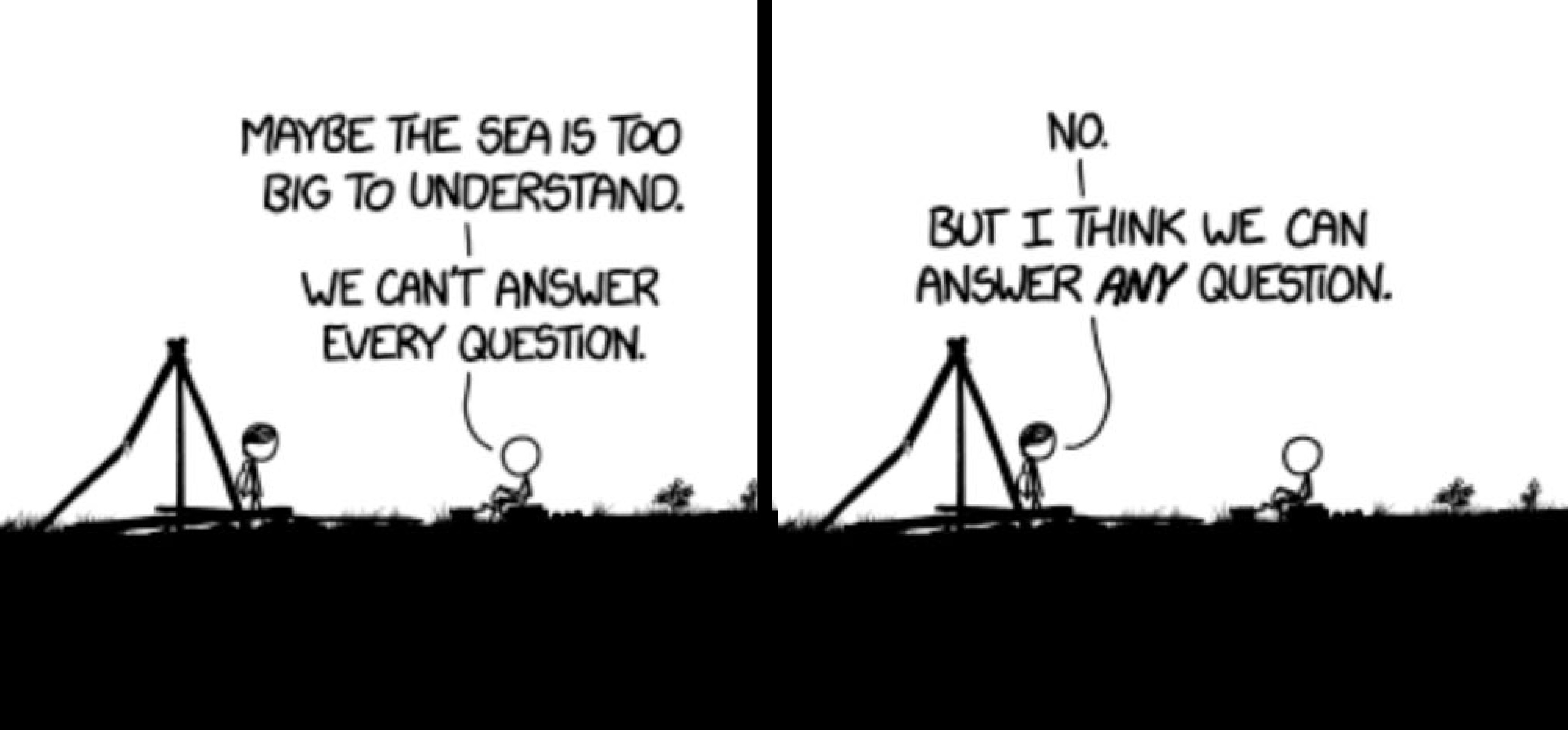
https://en.wikipedia.org/wiki/Time_(xkcd)
Further reading
- I felt inspired to write this after reading Emmett Shear's Twitter thread about Hereticon. It made me aware of this idea of a "social theory of truth".
-
Sabine Hossenfelder has a video called Flat Earth "Science" -- Wrong, but not Stupid that does a great job explaining the nuance here.
- If we follow the "personal experience trumps consensus" thing to the extreme, you might end up in a place where you reject a round Earth. Sabine argues why it's perfectly valid to accept truth on social consensus.
- I never seriously doubted the roundness of the Earth, but I wondered for a long time how I could validate it in my own life. Learning how to receive & decode raw signals from satellites provided really satisfying validation for me (and also proof that satellites probably do exist).